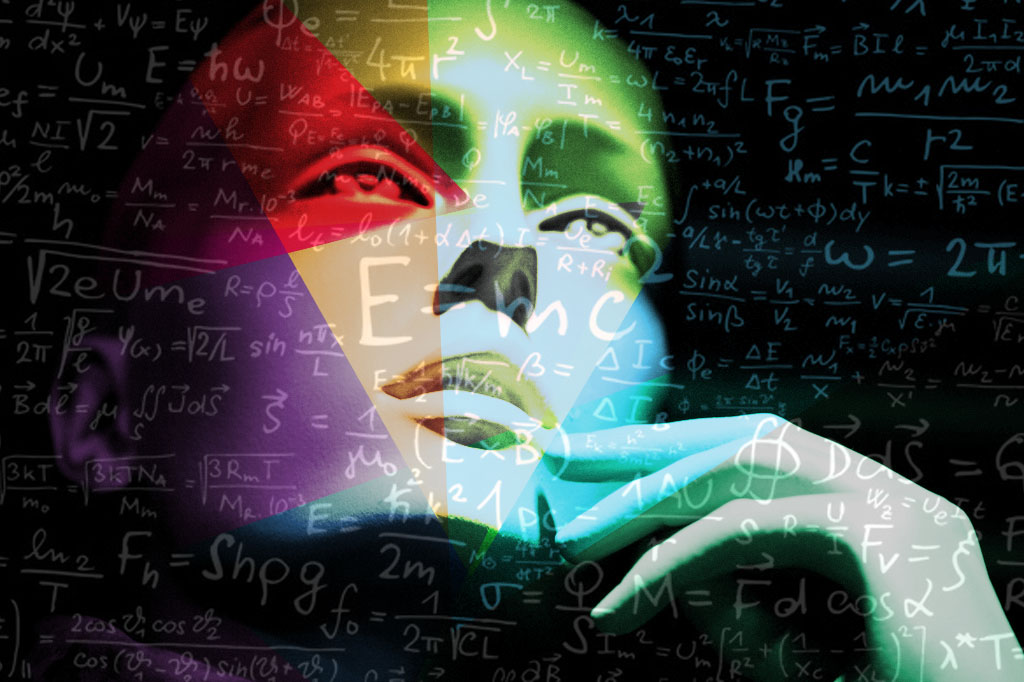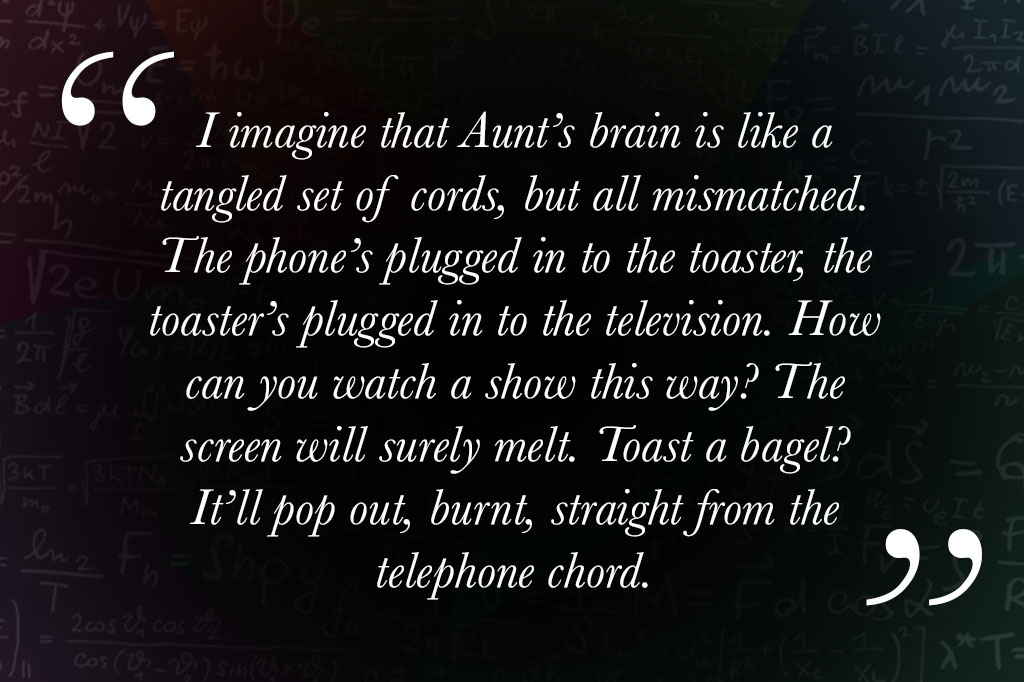A Niece Explores the Intricacies of the Schizophrenic Mind.
by Candace Mittel
Introduction: See it, Read it, Live
“We’re seeing it live,” Aunt says often in the middle of conversation. What are you doing today? “We’re seeing it live.” How was Florida? “We’re seeing it live, too.” See you tonight at 6 o’clock, okay? “Yeah, we’re seeing it live; we could see it live; are you also watching it live?”
I don’t know what it means — no one does — and no one seems to be interested in wringing it out. We brush off her words and habitually let them fly past our ears with no more than a hiss. Then we justify the neglect — oh, Aunt has schizophrenia, so she doesn’t make sense — with a big, bright Crazy sticker, the one so blithely placed on those we, The Normals, do not understand.
But I think it’s all too simple, too indifferent, and so the following emerged. This is a piece about humanity, personhood and perspective. I originally attempted to swallow the subject in one comprehensive chunk, to get a handle over it all, to gain control. But control and schizophrenia are like oil and water, and that’s the sort of chemistry that spilled over these pages.
I am not seeing it live, and I am angry because of it, frustrated with the replays, the failure of the brain in certain skulls. How did this come to be?
The germination of this piece was a desperate waving about for definitive answers, but none emerge. I search for an opening, a port of clarity or meaning, but I stumble. You, however, will be seeing it live, reading it live. I have not accepted the unanswerable, so I don’t expect you too either, but I have let the words sit here so that they may challenge.
And I needed to bring Aunt to you live. Let her travel with you.
I. Learning Disease, Disorder and Disaster
My dad told me his sister was ill when I was 12 years old, at a time when I was not even close to maturity but wearing two padded bras under my blouse to pretend that I was. We had just finished what I thought was a typical family Shabbat dinner. It was chaotic — lots of yelling across the table, melodramatic fussing over the amount of chicken on my cousin’s plate, and a broken pickle tray
My dad and I were sitting in the living room watching the Braves game, our standard evening ritual during baseball season. I was waiting for my mom to throw a warm, soapy rag my way and yell for me to get off my butt and help her clean the kitchen, but she didn’t. I know now that they must have conspired beforehand with hushed voices in the master bathroom (where all of their secret parent agreements took place), so my mom was in cahoots with my dad, and there was no wet rag flying at my face.
During a commercial break to relieve the pitcher in the top of the 7th, my dad slowly swiveled his way around and lightly tapped his glasses up his nose.
“Did you ever notice anything strange about Aunt?” He bit the insides of his cheeks with his teeth to stop the corners of his mouth from creeping upward.
I always thought Aunt was maybe a little odd. Her appearance was a bit funny — her bony frame hidden behind baggy, mismatched or inappropriate clothing, like when she would wear her son’s old T-shirts with holes to a fancy restaurant or turtlenecks in the summer. Her skin was too wrinkled by about twenty years, leathery, dry and sagging; her hair was thin and frizzy, kind of wiry and often untamed, curling in different directions like a Nobel Prize-winning physicist’s hair should be.
“Mmmm…she dresses funny?” I replied.
“Well, yes — that.” My dad didn’t contain his smile now. He let it stretch right across his graying beard. It wasn’t a simple smile, but one revealing a strange paradox of emotions. He was both dripping with discomfort and exhaling relief that this conversation was finally happening, itching to blurt something out.
And I suppose it was also a really sad smile — for the naiveté of his daughter who thinks her aunt just dresses funny.
“Anything else you think is sort of strange?”
I tried to think harder about possible peculiarities. She sometimes talked too loudly and too close to my face. She often engaged in nonsensical shouting arguments with her mother during holiday dinners, during which she never ate a bite, always swearing that she had just eaten nachos, banana bread, pizza and a few chocolate donuts. “I’m a fat pig these days, eating like an elephant, growing and bulging, look at me, so fat and stuffing my face, stuffing stuffing, pigs,” she would mumble.
While we all ate, she would either pace around the table or wander outside for a few cigarettes. When she did finally sit down with us, she would often talk about inappropriate topics — farting or sex — but no one would reprimand her.
I tried again: “What, that she always says funny things?”
To me, at 12, Aunt was just eccentric and wild. She had a son and a husband, and I had never thought much of it. I shrugged my shoulders.
“Well, it’s more than that,” my dad said. “Aunt has schizophrenia.”
He wasn’t smiling anymore.
II. The Miraculous, Mysterious Brain
The brain is the most extraordinary entity.
Although merely a three-pound mass of marmalade, the brain is comprised of 100 billion neurons. Each one contacts up to 10,000 other brain neurons, which calculates to more permutations of brain activity than the number of elementary particles in the entire universe. These neuron interactions produce every human behavior, every human potential.
This is where it’s at. Your essence is in your head. It’s telling you to talk, laugh, cry now please, no don’t do it, listen, eat, go ahead, have another cookie, walk, skip, run, stop, sit, read, understand, stand up, sit down, move here, move there, talk, giggle, converse, process, argue back, get to work, chat, solve, listen, eat, slip inside your sheets, stop.
Now consider the following: Talk, laugh, cry now please because you are a murderer of hundreds of people with your thoughts, no don’t do it, listen, don’t eat because you are evil, and your colleagues are out to get you, don’t have another, don’t walk, walk, no skipping, running, stop, sit because they want to destroy your career, and they’ve only been pretending to like you and invite you to coffee out of courtesy, can’t read, don’t understand, stand up, sit down, sit in a ball on the floor and moan and cry for three days straight, talk, giggle, it’s funny, no cry, and don’t sleep and don’t eat a thing, and don’t turn on the lights. When you finally do go outside, the houses will speak to you when you walk by as the doors turn into giant, chilling mouths, and bulging lips will whisper in your ear like the wind.
The brain is the most mysterious entity.
As miraculous as the human brain is in its conventional functioning, when it can do things like question the meaning of life, understand nuclear physics, or simply converse with another human, it is as forcefully catastrophic and as mysterious as ever when it goes wrong — when areas of the brain, such as the frontal cortex and the temporal lobes, are abnormal; when neural circuits are refashioned; when certain receptor levels are off-balance.
Schizophrenia is a brain disease. It is arguably the ugliest and most perplexing of all mental disorders. Roughly 1.1 percent of the adult population in the United States — 2.4 million people — are affected by it. Its most notable characteristic is psychosis, often accompanied by hyper-paranoia. Nuclear explosions are about to be set off in my brain. My brain is radioactive. There are Martians watching me through hidden cameras in the TV. The CIA is controlling my thoughts. I’m closing the curtains from now on because people across the street are looking at me. They can hear what I’m saying. They are angry. They want to hurt me.
Psychosis can include delusions and hallucinations, auditory or visual. Reality is not something I understand. I am having a nightmare while I am awake. I cannot stop it.
There is not one definitive symptom of schizophrenia, but rather a collection of behaviors that eventually lead to a diagnosis:
- Deteriorating functioning
- Loss of interest in activities
- Avoidance of social interactions or work
Aunt calls my mother 30 minutes before dinner on the eve of Rosh Hashanah, the Jewish New Year, to tell her she won’t be coming: “I’m numb from eating too much, and my knees are bad, and my back hurts, and I’m so out of shape, and the medicine is making me dizzy as hell.” Her husband, son, and three stepchildren show up at 7 p.m. without her. She calls three more times during the night to see what’s going on, what we’re eating, if the house is clean, who’s there, what she’s missing out on.
- Odd beliefs and superstitions
Aunt looks up at the hanging plant from the ceiling and thinks it’s a microphone. She says to my dad, “You know what those are? You know — you know, they’re watching. They’re listening. You know. And you’re part of it.”
- Strange behavior, such as talking to oneself in public
- Thinking out loud in a nonsensical stream of consciousness
- Inability to discern appropriateness of words
My dad takes his sister to see Dr. Kana, the psychiatrist who “has no compassion or empathy,” as my dad notes. “He’s just there to give her the shot and that’s it.”
In the crowded waiting room, Aunt begins to babble and yell, “Oh my goodness, I am so itchy! So itchy! This yeast infection came back again!”
My dad looks away, eyes rolling — not again — as he sinks into his fleece, wishing, just for a moment, that she was not his sister.
- Hallucinations
- Delusions
- Extreme paranoia
- Thought insertion
- Confusion
- Apathy
- And, eventually, complete social withdrawal.
I imagine that Aunt’s brain is like a tangled set of cords, but all mismatched. The phone’s plugged in to the toaster, the toaster’s plugged in to the television. How can you watch a show this way? The screen will surely melt. Toast a bagel? It’ll pop out, burnt, straight from the telephone chord.
Or sometimes I think her brain must be like the aftermath of an uncovered and over-microwaved bowl of spaghetti with sauce, with bits of marinara splattered inside the microwave’s walls, the bowl sizzling and overflowing, overcooked and now inedible.
When she speaks, it’s as if she is communicating in some type of code, the job of the hapless listener to translate each word in the context of each sentence, each sentence in the context of the conversation, and then to sort it all out like a puzzle. One must first scramble to find the edge pieces, the sentences hidden in the rumble of gargle and gibberish, in order to give her words some sort of structure and meaning. Then, one must locate the individual words, also splattered about the mess unorganized, and put them in their correct place, pink flowers by pink flowers, blue sky by blue sky.
Disordered thoughts and speech are indeed common features of the disease: We’ve got to case the joint. I don’t believe in joints, but they do hold your body together – an example of what psychiatrists call “loose association” from Elyn Saks’ The Center Cannot Hold: My Journey Through Madness. Car and flies go find the word that needs to be dictated in countries where murderers are. They won’t let me drink my orange juice. Fine stupid everyone goes ballistic these days trains and planes – an example of “word salad.”
Treatment for the disease is far from triumphant. Only about a third of individuals with schizophrenia will respond well to drug therapy, recognize that the drugs help them and continue to take medicine and attend psychotherapy in order to function and live a life free of psychosis. This third can be completely recovered for long periods at a time. Another third will also respond well to drugs, but will voluntarily stop if not forced to take them, making the inconsistent or occasional doses of oral medication ineffective. The last third will not respond to drug therapy at all.
Aunt falls in either the second or the final category. It’s hard to tell because she seldom takes her medicine properly. Sometimes, instead of taking the three prescribed pills, she’ll only take one, or instead of taking the doses three times a day, she’ll take them just once. She would prefer to take zero pills no times a day, but she knows by now that if she doesn’t take any of it, she will be hospitalized. Again.
III. A Shared Day
On May 10, 1991, some time near daybreak, my mother lay in a bed at Northside Pediatrics Hospital, sheltered from Atlanta’s muggy spring heat, and at 8:15 a.m., I slid right out into the nurse’s snappy gloved hands.
Now, out of the hundreds of days on the calendar year, I happened to be born on the 10th of May. The 10th of May! The very same day my father’s only sister, my schizophrenic Aunt, was born.
So, you see, the worry has existed since birth.
My mother is hardly a superstitious woman — she eats facts for breakfast stirred right into her cheese grits — but did everyone really just overlook this spooky connection? Outwardly, it was certainly ignored, even refuted. “You have the exact same hair as Aunt did when she was your age,” my grandmother used to tell me when I was a child. “No she doesn’t, Mom,” was always my dad’s stern response.
The hush existed from birth. And things are only hushed when they are feared.
I am also not superstitious. The prophetic age ended with the destruction of the Temple in Jerusalem almost 2,000 years ago. I do not believe in divine interventions, mystical predictions or foreshadowing in today’s world, yet fear is not something I can shove aside. My fear is in her eyes, wild and blank. It’s in the creases of her smoky wrinkles, thick crevices of wandering confusion. It’s in the sharp bones of her elbows and the wide gap between her yellowish-grey rotten teeth. My fear rests in every broken and disheveled part of her ill body, from her bulging, veiny knees shaking in oversized or undersized sneakers to the split-ends of her stringy, chaotic hair; but it’s mostly in her eyes, wild and blank. They gape into mine, forceful and steady, like water from a fire hydrant shooting right out of her pupils and into mine, hard and deep, projecting their way through my face and into the back of my skull. The pressure — it hurts. I look away.
There is something in our birth date that incessantly sits with me, breathes with me, and uncomfortably so. We may blow out candles together, but that’s the beginning and end of our resemblance. Right?
One year at our shared birthday party with the family — I think I was turning 16 and she 48 — Aunt handed me a small present wrapped with a ribbon. It was a half-used Chapstick.
Note: This is Aunt and the Brain: Part I. We will publish the second and third parts in the upcoming weeks, so check back soon to continue reading!
Candace Mittel is a recent graduate of Northwestern University where she studied Mathematics, Jewish Studies and Creative Writing Nonfiction (and no, they are not connected, but she’s open to suggestions). She currently lives in a Starbucks-free city, otherwise known as Jerusalem, and studies at the Pardes Institute of Jewish Studies where she spends her days (and often nights) making 2,000 year-old arguments relevant to her life today. Candace enjoys interviewing Israelis on the street (see her website Jerusalem Medley), listening/singing to the Les Mis soundtrack and eating a superbly ripe avocado or mango.







